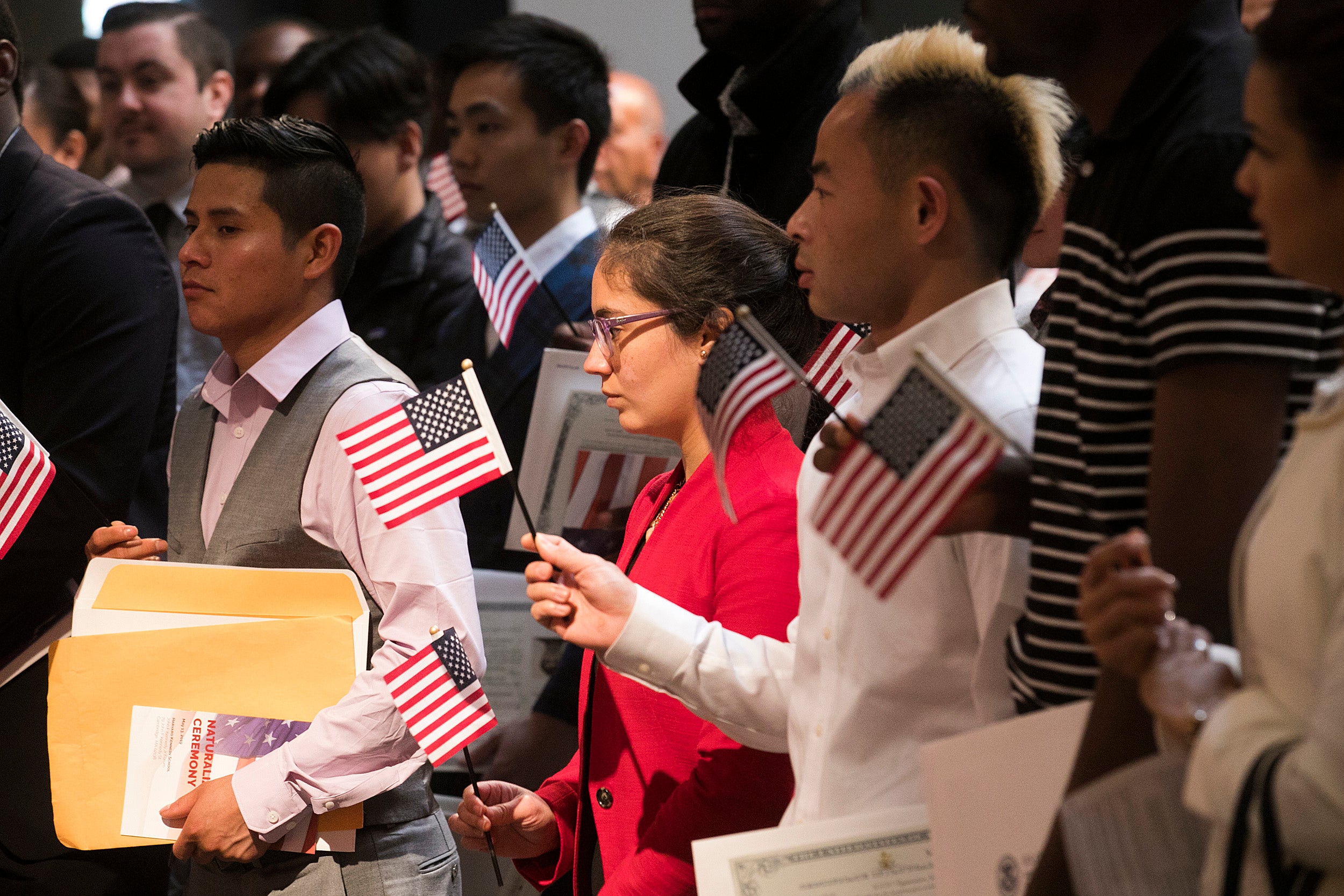
A 2019 citizenship ceremony hosted by Harvard Kennedy School.
Jon Chase/Harvard file photo
Reimagining rights
A report from the Carr Center outlines policy changes to protect and expand citizens’ rights
A report released today by researchers at Harvard Kennedy School’s Carr Center for Human Rights offers 80 recommendations for reimagining Americans’ rights and responsibilities. This blueprint for protecting and expanding citizens’ rights proposes policy changes to strengthen democratic processes; safeguard equal protection, equal opportunity, and due process of law; and better protect freedoms of speech, media, religion and privacy.
The report, “Reimagining Rights and Responsibilities in the United States,” was released at a virtual event at the Kennedy School. The Reimagining Rights and Responsibilities Project is directed by John Shattuck, Carr Center senior fellow and former U.S. assistant secretary of state for democracy, human rights and labor. The report and the project are overseen by a faculty committee chaired by Carr Center Director Mathias Risse, the Lucius N. Littauer Professor of Philosophy and Public Administration.
“Events this year — the COVID pandemic, massive nationwide protests for racial justice, attacks on voting rights — have underscored the urgency of a national renewal of rights,” said Risse. “Since the fall of 2019, the Carr Center’s Reimagining Rights and Responsibilities Project has worked to strengthen the principles of equality and liberty that are enshrined in our country’s founding documents.”
Last month, the Reimaging Rights Project released a nationwide poll of a broadly representative sample of 2,093 adults on attitudes toward rights in the U.S. An overwhelming, bipartisan majority agreed that “without our freedoms America is nothing,” and 71 percent felt that despite deep polarization, “Americans have more in common than many people think.”
The project also convened town hall meetings with citizens in Phoenix, Detroit, and Atlanta. Insights from the poll and the meetings enabled researchers to build a comprehensive portrait of the attitudes of Americans on the current condition of rights and responsibilities in the United States.
“Rights in the U.S. are values that hold together a nation of great diversity,” said Shattuck. “The U.S. is a nation wrestling with its values at a time when rights are facing the gravest threats in half a century. Our report is a guide for reimagining rights and the responsibility of leaders and citizens to protect them.”
The report offers an in-depth analysis of the state of rights in America in 2020, and then offers recommendations to address failures to protect these rights. Key recommendations include:
- To strengthen the democratic process: eliminate restrictions on voting participation; restore the Voting Rights Act to guard against voting laws with a racially discriminatory impact; prevent partisan gerrymandering; require and fund civic education; and amend the Constitution to abolish the Electoral College and permit the regulation of campaign finance.
- To safeguard the right of equal protection: reform policing, law enforcement and the criminal justice system; strengthen civil rights protections against discrimination, including hate crime laws; and create measures to guarantee equal access to education, employment, housing, environmental protection and health care.
- To promote due process and the rule of law: secure due process and humanitarian protections in immigration proceedings; reduce incarceration and juvenile detention; reform sentencing laws; and enact laws that balance gun rights with public safety.
- To protect freedoms of speech, religion and privacy: create a digital public infrastructure; require social media transparency and accountability; protect the free exercise of religion equally for all religions and reestablish a balance of claims of religious freedom with other constitutional rights; develop national privacy policies and standards and create a federal privacy and data commission with broad authority to enforce privacy standards.
The Carr Center for Human Rights Policy serves as the hub of the Harvard Kennedy School’s research, teaching, and training in the human rights domain. The center embraces a dual mission: to educate students and the next generation of leaders from around the world in human rights policy and practice; and to convene and provide policy-relevant knowledge to international organizations, governments, policymakers, and businesses.




